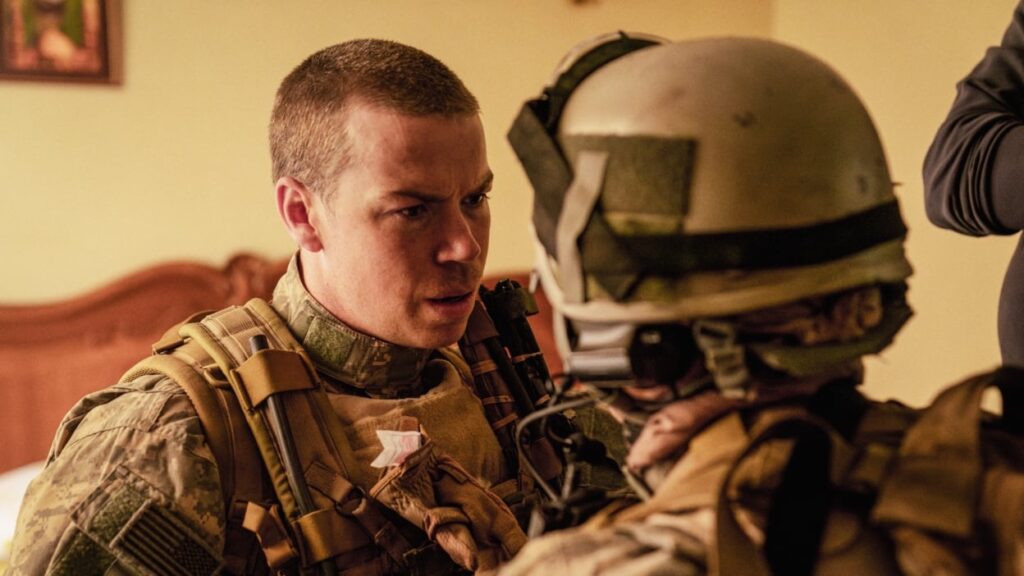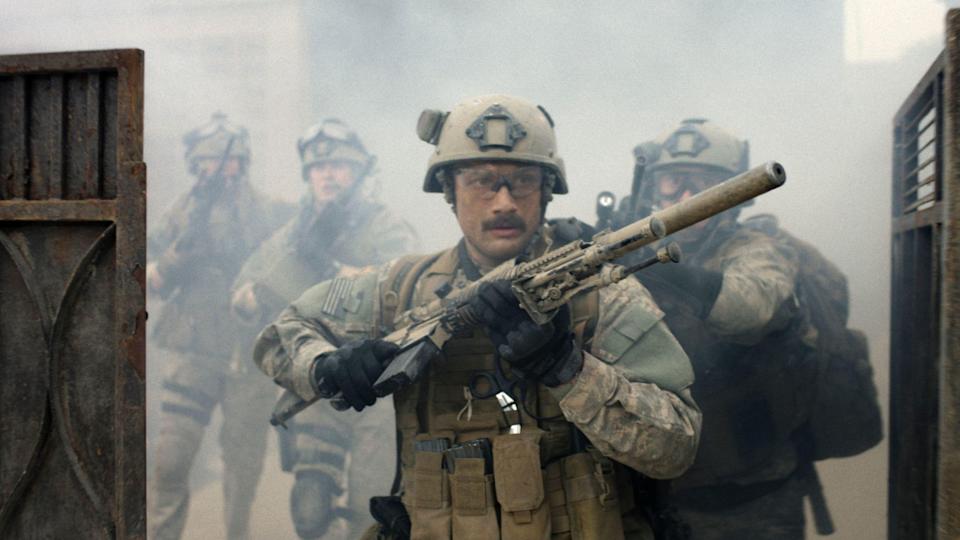Honest Look at War a world saturated with Hollywood war dramas that often romanticize or oversimplify the horrors of combat, Warfare offers something completely different. Co-directed by acclaimed filmmaker Alex Garland and former U.S. Navy SEAL Ray Mendoza, Warfare delivers a raw, real-time experience of a brutal military mission during the Iraq War, pushing the boundaries of what war cinema can achieve.
Set during the intense 2006 Battle of Ramadi, the film follows a Navy SEAL team’s harrowing surveillance mission through a hostile urban landscape. Unlike traditional war movies that often rely on sweeping music, dramatic speeches, and stylized action, Warfare strips everything down to the bone. What is left is a gripping, minute-by-minute survival story, filled with fear, chaos, exhaustion, and small moments of human connection.
A Mission That Hits Close to Home
Ray Mendoza isn’t just co-directing this story—he lived it. Mendoza served over 16 years in the U.S. Navy as a SEAL, seeing combat up close in Iraq and Afghanistan. The mission depicted in Warfare is based on one of his own life-or-death experiences in Ramadi.
Determined to honor the memories of the men he served with, Mendoza spent years speaking with his former platoon mates, gathering detailed recollections to reconstruct what happened that day. His friend and teammate Elliott Miller, who was severely wounded during the mission and now has no memory of it, served as a particularly emotional reason for Mendoza to ensure the story was told right.
“This film isn’t a dramatization — it’s a living document,” Mendoza explained in an interview. “It’s meant for the men who lived it and for those who didn’t make it home.”
Breaking New Ground in War Films
One of the most unique aspects of Warfare is its commitment to showing combat as it actually feels: confusing, terrifying, and relentless. Garland and Mendoza decided to shoot the film in real time. Every minute that passes on the screen mirrors the real events on the ground. There are no shortcuts, no time jumps, and no Hollywood-style “hero moments.”
Instead of an emotional soundtrack swelling in the background, the film relies purely on environmental sounds — the buzz of drones, distant gunfire, shouted orders, and the heavy, pounding silence of anticipation. This minimalist approach pulls the audience into the soldiers’ mindset, making every decision feel urgent and every mistake potentially fatal.

The cast, led by actors D’Pharaoh Woon-A-Tai, Will Poulter, and Cosmo Jarvis, underwent intense military training to prepare for their roles. They lived together, trained like soldiers, and learned to move, speak, and react as a real platoon would under pressure.
“We didn’t want acting,” Mendoza said. “We wanted them to be those guys, even when the cameras weren’t rolling.”
Critical Response: A Divided Conversation
Since its premiere, Warfare has sparked intense discussion among critics and audiences alike. Many have praised its commitment to realism and its refusal to glamorize violence. Some reviewers have compared it to classics like Saving Private Ryan, but argue that Warfare goes even further in capturing the terrifying disorientation of real combat.
However, the film hasn’t been without controversy. Some critics have pointed out that Warfare focuses almost entirely on the American soldiers’ experience, offering little insight into the Iraqi civilians who were also caught in the battle.
Others argue that by staying so close to the immediate perspective of the SEALs, the film misses an opportunity to comment more broadly on the political and human cost of the Iraq War.
Still, Garland and Mendoza are unapologetic about their vision. “This story isn’t about the politics,” Garland said. “It’s about what it feels like to survive one more minute, one more hour, in a place where death is always just around the corner.”
Is Warfare an Anti-War Film?
The question of whether Warfare is an anti-war film has followed the project since its early development. Garland and Mendoza have both spoken about this at length.
“I don’t think you can truly show what war is without it being anti-war,” Garland said. He explained that when people witness the true horrors of battle, without the filters of patriotism or heroism, it naturally inspires reflection and sometimes even regret.
Mendoza echoed these thoughts but added a deeper layer. For him, Warfare is not about passing judgment. It’s about giving audiences a front-row seat to the truth — and letting them decide what to feel.
“There’s no message shoved down your throat,” Mendoza said. “We’re showing you what happened. You can interpret it how you want.”
Honoring the Fallen
Above all, Warfare is a tribute to the soldiers who risked everything, including those who didn’t come home.
During filming, Mendoza carried with him the weight of responsibility to accurately portray not just the action, but the relationships, the small jokes, the quiet fears, and the sense of duty that bonded his platoon together.
In one particularly moving scene, a character shares a brief, awkward laugh with his teammate while pinned down under enemy fire. It’s a tiny, human moment, but it feels monumental. In these small beats, Warfare captures the deep humanity of soldiers who are too often turned into faceless symbols in broader political narratives.
Final Thoughts
Warfare isn’t an easy movie to watch, but it is an essential one. By focusing on authenticity over spectacle, and on human experience over politics, Garland and Mendoza have crafted a film that sticks with you long after the credits roll.
At its heart, Warfare is about survival, brotherhood, fear, and sacrifice. It refuses to look away from the darkest parts of war, and in doing so, it reminds us that behind every mission are real people with real lives, dreams, and families waiting for them.
In a time when conversations about the nature and consequences of war are more important than ever, Warfare stands as a brutal, beautiful, and necessary addition to the world of cinema.
Iraq Explores Restoring Syrian Oil Export Pipeline to Mediterranean



